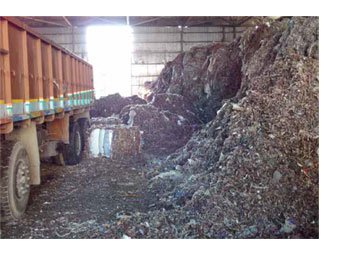Environment. Being future-ready.
Waste as Wealth GRI-306
Waste poses a major challenge which can be solved through innovative thinking and concerted efforts. We use our raw materials judiciously to minimise waste generation and ensure that a large part of our waste is recycled for productive use. For example, fly ash generated from our captive power plants is used for blending cement. Apart from managing our own waste in an environmentally responsible manner, Ambuja Cement provides state-of-the-art sustainable waste management services to other industries and waste generators under the umbrella of our Geocycle brand. We co-process waste from the agricultural, industrial and public/municipal sectors. We have also provided solutions for sorting municipal waste. While offering waste management solutions to various industries, we also pay attention towards developing safe and efficient solutions for the country’s enormous municipal solid waste challenge. We have increased co-processing of refuse-derived fuel (RDF) and segregated the nonrecyclable combustible fraction of municipal solid waste in our facilities. Rigorous efforts have been made to identify various sources, establish a robust supply chain, and co-process the refuse in our plants. The range of waste streams in our co-processing services increased significantly with the entry of new customers and industry segments. With higher usage of alternative fuels and raw materials, Geocycle has made a significant contribution to replacing traditional nonrenewable fuels like coal. By reducing its reliance on natural resources, the Company reduces the impact of the waste on the environment and also lowers its overall ecological footprint. The year 2015 marked the stepping up of our waste management operations through fully operational pre-processing facilities in four locations.
 Due to our aggressive
emphasis on co-processing,
we have gone a long
way in replacing natural
resources used in cement
manufacturing. This has
been facilitated through
large scale investments in
R&D for and upgradation
of pre- and co-processing
infrastructure in our plants.
Our efforts to achieve
greater technical and legal
traction for co-processing
technology have borne fruit.
In the recent changes to the
Indian waste legislations
in 2016, co-processing
has been recognised as a
preferred technology for
waste management.
Due to our aggressive
emphasis on co-processing,
we have gone a long
way in replacing natural
resources used in cement
manufacturing. This has
been facilitated through
large scale investments in
R&D for and upgradation
of pre- and co-processing
infrastructure in our plants.
Our efforts to achieve
greater technical and legal
traction for co-processing
technology have borne fruit.
In the recent changes to the
Indian waste legislations
in 2016, co-processing
has been recognised as a
preferred technology for
waste management.
In the year 2016 we co-processed about 1.8 lakh tonnes of alternative fuels (AF) in our kilns with a thermal substitution rate (TSR) of 5.14%. This was lower than the 5.71% in 2015, due to sourcing constraints. Additionally, 56,423 tonnes of AF were utilised in our captive power plants, taking the total consumption of AF to 2.6 lakh tonnes.
Health and safety (H&S) is one of the core values of our co-processing business. H&S is integrated with our business processes spanning people, processes, systems, technologies and facilities. H&S is driven through Top Management commitment and visible leadership across all levels. We recognise that the health and safety of our employees, subcontractors, third parties and visitors is vital to our business success. ACert, our internal risk and safety assessment and certification programme for AFR installations, strengthens this commitment. Our H&S Policy has been rolled out across all operations and included as a key responsibility in line management and business performance. Organisational accountability is supported by a robust programme of training, communication and risk management. Any risks involved in our operations are proactively managed.
The Company tracks significant spills through its iCare system, which is an online data collection tool. There were no incidents of significant oil spills recorded in the reporting period. No hazardous waste transportation involved shipment to/from locations abroad. GRI 306 (3, 4)